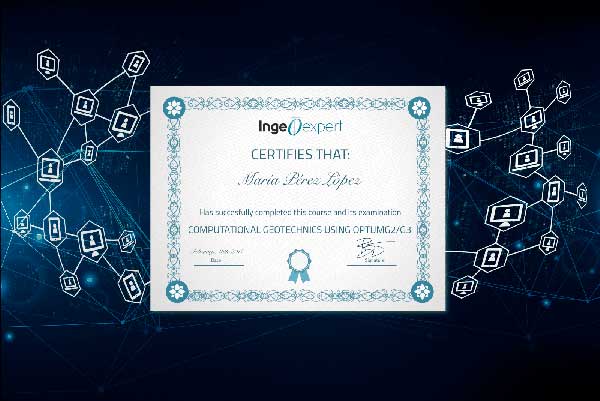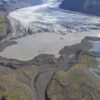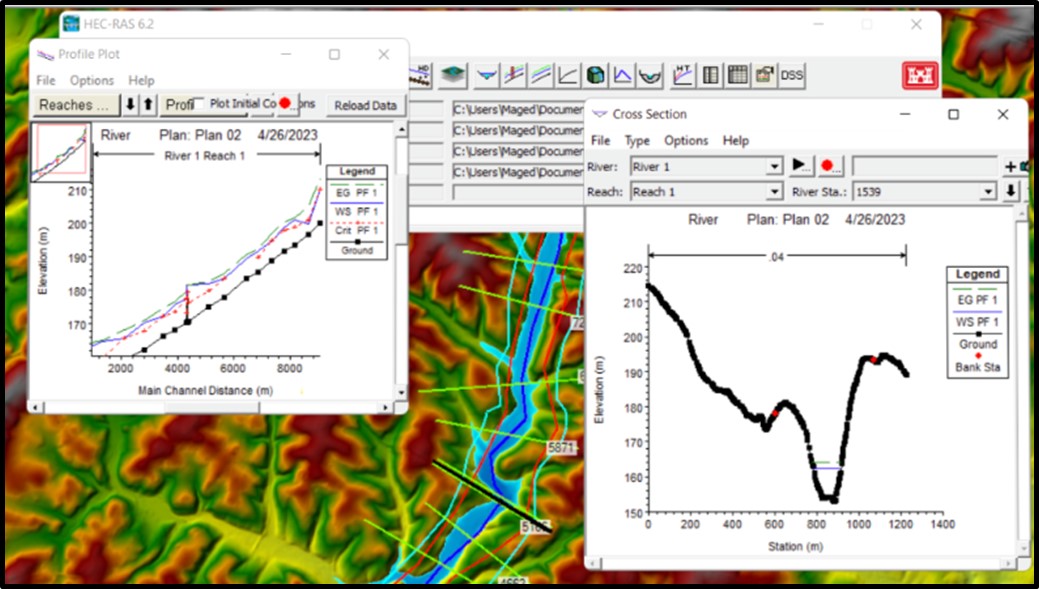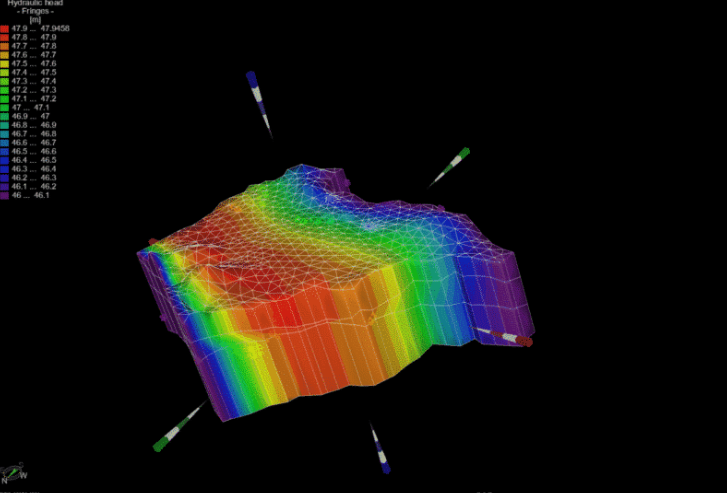Numerical Modeling of Groundwater: Practical Applications using FEFLOW
Online course |
|
50 hours / 6 weeks |
|
To be determined |
Introduction
This is a mixture of theoretical and hands-on course on groundwater modeling using FEFLOW, one of the most powerful tools currently available for the simulation of flow and contaminant transport in porous and fractured media, both in the saturated and the unsaturated zones. FEFLOW also is capable of simulating variable density fluids, allowing the simulation of saltwater intrusion, as well as heat transport.
Participants will review the theory of flow and contaminant transport, as well as the creation of three-dimensional models, use of proper boundary conditions, calibration, running predictive runs and analyzing results. There will be a number of practical exercises which the students will be able to follow using the temporary licenses provided in the last 10 days of the course.
Objectives
The main objective of this course is to understand the basic concepts of groundwater flow and contaminant transport and to be capable of applying FEFLOW in practical situations. At the end of the course the attendee will have a better understanding of:
- Groundwater Flow principles, both in the saturated and unsaturated zones, and important parameters to enter in a numerical model;
- Contaminant Transport principles and main parameter to enter in a numerical model;
- How to build a conceptual model;
- Proper uses of Boundary Conditions;
- How to build a numerical mesh, both structured (triangular prisms) and unstructured (tetrahedral);
- How to calibrate a model, both manually and using PEST;
- Running predictive scenarios.
A temporary license will be provided to use during the last 10 days of the course in order to install and use the software.
Module 1 – Principles of Groundwater Flow in the Saturated and Unsaturated Zones
Module 2 – Principles of Contaminant Transport
Module 3 – Groundwater Flow and Transport Diferential Equations and Numerical Solutions
Module 4 – Building Conceptual Models
Module 5 – Building Numerical Grids
Module 6 – Importing Geological Models into Numerical Grid
Module 7 – Boundary Condition Types and when to use them
Module 8 – Fundamentals of Model Calibration
Module 9 – Using FePEST to assist with model calibration
Module 10 – Running predictive Scenarions
Module 11 – Creation of presentations and animated videos with results
Module 12 – Practical Exercises at the attendee´s pace using provided temporary licenses with one live session for questions and discussions
Nilson Guiguer, Ph.D.
Renowned instructor and leading expert in the field with over 30 years of hands-on experience.
Civil Engineer, M.Sc. in Hydraulics and Hydrology from the University of São Paulo, Ph.D. in Geology (emphasis in Hydrogeology) from the University of Waterloo. Founder of the company Waterloo Hydrogeologic in Canada, later sold to Schlumberger, where he served as Vice President and Global Marketing Director of the Schlumberger Water Services division. He served also as Managing Director of FEFLOW´s developer company DHI, former professor at the Federal University of Santa Catarina, and is currently the CEO and Principal Modeler at Water Services and Technologies Ltd.
Recognized specialist in groundwater simulation, author of several worldwide used groundwater simulation packages, such as Visual MODFLOW, Flowpath and Airflow/SVE, as well as data interpretation and visualization packages such as Hydro GeoAnalyst. Furthermore, he was responsible for bringing FEFLOW in the early 90´s from German to English, and from Unix to Windows.
Author of several scientific works, he received the John Helms Award, in 2000, from the National Ground Water Association (NGWA) of the United States, an award given annually to those who most contribute to the advancement of science in the field of groundwater.
He has extensive experience in the mining and oil and gas industries, as well as in integrated water resource management, acting actively in the execution and management of modeling projects.
The course is delivered online through our easy-to-use Virtual Campus platform. For this course, a variety of content is provided including:
– eLearning materials
– Videos
– Interactive multimedia content
– Live webinar classes
– Texts and technical articles
– Case studies
– Assignments and evaluation exercises
Students can download the materials and work through the course at their own pace.
We regularly update this course to ensure the latest news and state-of-the-art developments are covered, and your knowledge of the subject is current.
Live webinars form part of our course delivery. These allow students and tutors to go through the course materials, exchange ideas and knowledge, and solve problems together in a virtual classroom setting. Students can also make use of the platform’s forum, a meeting point to interact with tutors and other students.
The tutoring system is managed by email. Students can email the tutor with any questions about the course and the tutor will be happy to help.
Training in geology, civil engineering, environmental and related with notions of hydrogeology.
Professionals, students, researchers, and managers who deal with challenges involving groundwater, from resource quantification, environmental impact assessment, to contaminant transport and remediation, wish to learn about numerical modeling or to improve their skills in using FEFLOW.
Once a student finishes the course and successfully completes the assignments and evaluation tests, they are sent an accreditation certificate. The certificate is issued by Ingeoexpert to verify that the student has passed the course. It is a digital certificate that is unique and tamper-proof – it is protected by Blockchain technology. This means it is possible for anyone to check that it is an authentic, original document.
You will be able to download the certificate in an electronic format from the Virtual Campus platform. The certificate can be forwarded by email, shared on social networks, and embedded on websites. To see an example, click here.
This course will provide valuable tools that will complement professional training. The knowledge acquired will allow participation in projects in the field of management and planning of water resources, such as:
- – Environmental Impact Assessment
- – Groundwater Resource Evaluation
- – Groundwater extraction and optimum location and pumping rates of wells
- – Mine Dewatering and lowering of the water table in civil works
- – Groundwater Contamination transport and remediation options
Introduction
This is a mixture of theoretical and hands-on course on groundwater modeling using FEFLOW, one of the most powerful tools currently available for the simulation of flow and contaminant transport in porous and fractured media, both in the saturated and the unsaturated zones. FEFLOW also is capable of simulating variable density fluids, allowing the simulation of saltwater intrusion, as well as heat transport.
Participants will review the theory of flow and contaminant transport, as well as the creation of three-dimensional models, use of proper boundary conditions, calibration, running predictive runs and analyzing results. There will be a number of practical exercises which the students will be able to follow using the temporary licenses provided in the last 10 days of the course.
Objectives
The main objective of this course is to understand the basic concepts of groundwater flow and contaminant transport and to be capable of applying FEFLOW in practical situations. At the end of the course the attendee will have a better understanding of:
- Groundwater Flow principles, both in the saturated and unsaturated zones, and important parameters to enter in a numerical model;
- Contaminant Transport principles and main parameter to enter in a numerical model;
- How to build a conceptual model;
- Proper uses of Boundary Conditions;
- How to build a numerical mesh, both structured (triangular prisms) and unstructured (tetrahedral);
- How to calibrate a model, both manually and using PEST;
- Running predictive scenarios.
A temporary license will be provided to use during the last 10 days of the course in order to install and use the software.
Module 1 – Principles of Groundwater Flow in the Saturated and Unsaturated Zones
Module 2 – Principles of Contaminant Transport
Module 3 – Groundwater Flow and Transport Diferential Equations and Numerical Solutions
Module 4 – Building Conceptual Models
Module 5 – Building Numerical Grids
Module 6 – Importing Geological Models into Numerical Grid
Module 7 – Boundary Condition Types and when to use them
Module 8 – Fundamentals of Model Calibration
Module 9 – Using FePEST to assist with model calibration
Module 10 – Running predictive Scenarions
Module 11 – Creation of presentations and animated videos with results
Module 12 – Practical Exercises at the attendee´s pace using provided temporary licenses with one live session for questions and discussions
Nilson Guiguer, Ph.D.
Renowned instructor and leading expert in the field with over 30 years of hands-on experience.
Civil Engineer, M.Sc. in Hydraulics and Hydrology from the University of São Paulo, Ph.D. in Geology (emphasis in Hydrogeology) from the University of Waterloo. Founder of the company Waterloo Hydrogeologic in Canada, later sold to Schlumberger, where he served as Vice President and Global Marketing Director of the Schlumberger Water Services division. He served also as Managing Director of FEFLOW´s developer company DHI, former professor at the Federal University of Santa Catarina, and is currently the CEO and Principal Modeler at Water Services and Technologies Ltd.
Recognized specialist in groundwater simulation, author of several worldwide used groundwater simulation packages, such as Visual MODFLOW, Flowpath and Airflow/SVE, as well as data interpretation and visualization packages such as Hydro GeoAnalyst. Furthermore, he was responsible for bringing FEFLOW in the early 90´s from German to English, and from Unix to Windows.
Author of several scientific works, he received the John Helms Award, in 2000, from the National Ground Water Association (NGWA) of the United States, an award given annually to those who most contribute to the advancement of science in the field of groundwater.
He has extensive experience in the mining and oil and gas industries, as well as in integrated water resource management, acting actively in the execution and management of modeling projects.
The course is delivered online through our easy-to-use Virtual Campus platform. For this course, a variety of content is provided including:
– eLearning materials
– Videos
– Interactive multimedia content
– Live webinar classes
– Texts and technical articles
– Case studies
– Assignments and evaluation exercises
Students can download the materials and work through the course at their own pace.
We regularly update this course to ensure the latest news and state-of-the-art developments are covered, and your knowledge of the subject is current.
Live webinars form part of our course delivery. These allow students and tutors to go through the course materials, exchange ideas and knowledge, and solve problems together in a virtual classroom setting. Students can also make use of the platform’s forum, a meeting point to interact with tutors and other students.
The tutoring system is managed by email. Students can email the tutor with any questions about the course and the tutor will be happy to help.
Training in geology, civil engineering, environmental and related with notions of hydrogeology.
Professionals, students, researchers, and managers who deal with challenges involving groundwater, from resource quantification, environmental impact assessment, to contaminant transport and remediation, wish to learn about numerical modeling or to improve their skills in using FEFLOW.
Once a student finishes the course and successfully completes the assignments and evaluation tests, they are sent an accreditation certificate. The certificate is issued by Ingeoexpert to verify that the student has passed the course. It is a digital certificate that is unique and tamper-proof – it is protected by Blockchain technology. This means it is possible for anyone to check that it is an authentic, original document.
You will be able to download the certificate in an electronic format from the Virtual Campus platform. The certificate can be forwarded by email, shared on social networks, and embedded on websites. To see an example, click here.
This course will provide valuable tools that will complement professional training. The knowledge acquired will allow participation in projects in the field of management and planning of water resources, such as:
- – Environmental Impact Assessment
- – Groundwater Resource Evaluation
- – Groundwater extraction and optimum location and pumping rates of wells
- – Mine Dewatering and lowering of the water table in civil works
- – Groundwater Contamination transport and remediation options
1 review for Numerical Modeling of Groundwater: Practical Applications using FEFLOW
More info
Finish this course and get a certificate based on Blockchain
Numerical Modeling of Groundwater: Practical Applications using FEFLOW


Blockchain technology makes the certificate incorruptible, enabling companies to verifiy its autenticity.






Kongjai Sengpharchanh –
very good course.